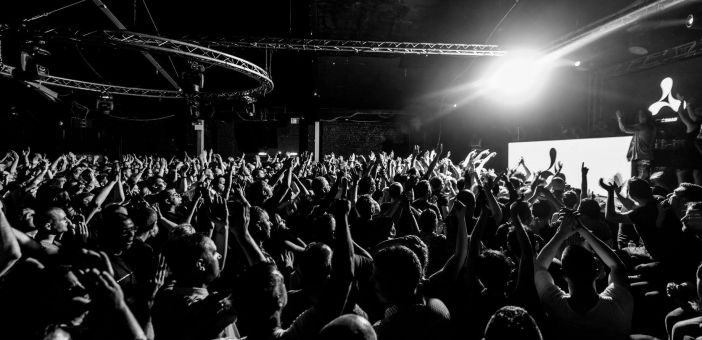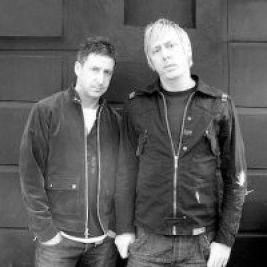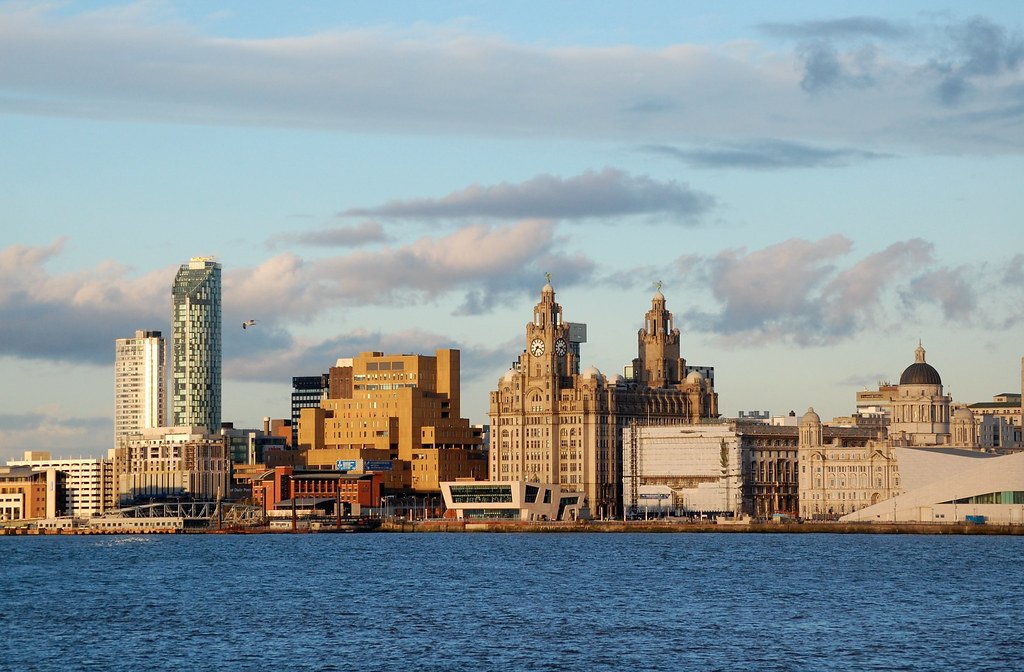
K-Klass interview: Rhythm Is A Mystery
Marko Kutlesa spoke to K-Klass about their defining productions, the early rave scene, their relationship with Cream and much more.
Skiddle Staff
Last updated: 2nd Nov 2017
K-Klass are one of northern England's original rave era acts, formed on the dancefloor at The Hacienda by some wide eyed and enthusiastic clubbers from Wrexham and Chester. From their first joint experimentations in the studio the group was quickly streamlined to four core members and an early demo tape was accepted by in-the-know Manchester record store Eastern Bloc for release on their label as The Wildlife EP in 1990.
Boasting a distinct Detroit techno influence it was quickly followed on the label by another K-Klass EP containing the track 'Rhythm Is A Mystery'. This track would be K-Klass's breakthrough moment, a peak time rave anthem etched in the annuls of the wild era. Restructured and re-recorded, a much more polished version would be released by the Deconstruction label in 1991 and reach number 3 in the UK pop charts.
K-Klass would continue their relationship with Deconstruction for much of the decade, releasing several albums and scoring another hit with 'Let Me Show You' (1993) before moving to Parlophone. They lent their production talents and remix services to the likes of M People, Kylie Minogue, Frankie Knuckles and Pet Shop Boys and their remixes of Bobby Brown's 'Two Can Play That Game', New Order's 'Ruined In A Day' and Luther Vandross and Janet Jackson's 'The Best Things In Life Are Free' went on to released and regarded as the definitive UK chart versions of those tracks and charted extremely highly. They took the piano lines from their early rave success and expanded their musicality, increasingly moving in a more soul influenced direction with many song based releases.
Since K-Klass left Parlophone the group has slimmed down to the duo of Russ Morgan and Paul Roberts and they continue to release singles, remixes and lend their production talents, sometimes anonymously, widely within the dance music industry. They formed the alternate, successful production alias We Deliver in 2004 with keyboard player Paul Birchall, have been nominated for a Grammy for one of their remixes - the first UK act to be nominated.
Through their long association with the Cream club brand (K-Klass played many times at the club and were briefly, initially managed by the club's co-founder James Barton) they were commissioned to co-produce the widely acclaimed Cream Classical shows that have wowed audiences. They bring it to Steel Yard on Friday 24th November.
What are your memories of the differences between Wednesday nights and Fridays nights at The Hacienda?
Paul: Wednesday night was more of a local crowd, a Manchester crowd. We travelled to it, from Chester, which is 40 miles away. We'd come on a Wednesday and get into trouble for getting in work late on a Thursday, or get stuck at The Kitchens in Hulme until 6am and then try and hitch home.
Wednesdays were more intimate, the music selection, certainly at the start of 1988, was more varied whereas Friday was house music straight down the line, with maybe the odd bit of hip hop. Wednesday was more for devoted clubbers. It only really stayed like that until 1989 and then Wednesdays got more house too. Hot was really good. Void lost it a little when that started. Friday was always our favourite.
Russ: Yeah, the Nude nights were really something else.
I read that the other two guys you started K-Klass with, you knew them from knocking around a bit and you'd seen them play live, but you met them again in The Hacienda and ended up going back to Wrexham with them after the club.
Paul: Yeah. It's unusual as in the days before that, coming from Chester, we would usually have done everything possible to avoid going to Wrexham. Ha! There's a lot of rivalry between the towns, because of football. The whole acid house thing, with everybody being loved up, broke all that down. We saw them support 808 State the week before in Chester.
Russ: They were going under the name Interstate and there were three of them, which was funny cos there were three of us as well. So, when K Klass first started there were actually six of us. We really liked what they did. They had 909 drum machines, all the right gear.
Paul: Me and Russ had been trying to make stuff at home, but when we heard them it was like “Wow! Their drums sound like they do on the records! We'll have some of that!”
We got chatting in The Hacienda, got into the usual state we did when we went to The Hacienda and decided to all go back together to make a track. We got back and literally set about it straight away. After a couple more visits, two weeks later, we had enough recorded for The Wildlife EP which, after a lot of messing around, was released on Eastern Bloc.
I kind of miss those days where you were so loved up and enthusiastic you thought nothing of going 50 miles out of your way for an afterparty with no thought given of how you were going to get home.
Paul: After The Hacienda you could end up sitting in someone's garden in Huddersfield until the next afternoon with 25 pence in your pocket.
Russ: Because The Hacienda always used to finish at 2am, at the end of the night people always wanted more. Nowadays things stay open later and it can almost peter out at 4am. But back then, 2am you were still ready for it.
Paul: Back then it was something you had to seek out, you had to be in the know to know about it. Now everything's presented on a plate. You have so many different choices of what you can do on a night out. Back then we could go sit in a pub in Chester, have a pint, then go get a kebab and possibly get your head kicked in at the end of the night.
Russ: Or you could go and listen to music that you couldn't hear anywhere else.
Paul: Yes. Nowadays some people only want to hear music that they've already heard. We actively went out to hear music that we'd never heard before. If there was a certain track you wanted to hear, but only one DJ had that track, you had to go to the club where that DJ was playing. That helped drive the whole scene forward.
You mentioned The Wildlife EP. It's a given that Chicago, where house music started, was a big influence on The Hacienda and therefore on yourselves, but on your first two EPs there's a real Detroit influence. Did that come from any particular member of the group, present or past and what particular sounds from Detroit were an inspiration?
Paul: We were much more inspired by the Detroit sound at the time.
Russ: I still say that finding Derrick May's mix of 'Wild Times' by De Lite in the racks at Eastern Bloc was one of the best moments in my life.
Paul: He's been married twice and had kids!
Russ: At that time, it meant that much!
Paul: Every piece of vinyl that came out of Detroit, whether it was good, bad or indifferent, we probably would have bought. We had people on side at eastern Bloc who would keep stuff like that aside for us. Obviously as our sound evolved we brought more vocals in and ended up going more towards the soulful side of it. But, again, that was Hacienda influenced. As what Graeme Park and Mike Pickering evolved, so did we.
Even going up to 'Let Me Show You' I can hear Detroit. There's like a siren sound in that which sounds really similar to one on a Carl Craig record 'Oscillator', which I think he took from 'King Of The Beats' by Mantronix.
Paul: We made that siren sound on a Korg Mono Poly. We'd take little bits of drum loops but we very rarely sampled. Most of it is original programming.
Another influence I can hear is the Italian piano house sound. Were there any particular Italian releases that made an impact on you? And who in the group was the piano player, if anyone?
Paul: Carl was the piano player, one of the guys who's left which is why, when we play now, we have to get Davos in to play the tricky bits that we're too crap to play. Anything more than three fingers, ha! There wasn't any one Italian track in particular. It was around the time of Cappella 'Helyom Halib' and 'Ride On Time'.
If you listen to the two versions of 'Rhythm Is a Mystery', the first one, released on Eastern Bloc is a straight up Detroit techno thing with a freestyle vocal and no song arrangement. That got to number 61 in the UK charts, no promotion. So, they said come back and do a more song structured version of it and that went big. We spent a long time structuring it and on the drums, because the thing with the Italian stuff was that the drums were often shit. We added the Italian piano element, then the saxophone and that, with the vocal, created the hooks. When we made the original we didn't have any idea how to write a song.
In regards specifically to New Order's 'Ruined In A Day' and Bobby Brown's 'Two Can Play That Game' it was K-Klass remixes that went on to be regarded as the definitive UK chart versions of those singles. Did you meet either artist after those releases and get any feedback?
Paul: New Order we met a few times. They used to come down and see us in the studio. We worked with Johnny Marr a bit, in the Electronic era and so Bernard would be in and out of the studio. Peter hook has said in more recent years that he really liked our remixes. We had no intention of them being the radio mixes when we did them it's just what the record companies decided, especially the Bobby Brown one. The most difficult part of that was where it slows down for the rap. That took two days alone to programme.
Russ: We never set out to write a hit record. We only ever tried to write things we like.
Which of your remixes are you most proud of?
Russ: I think we can answer that together. Frankie Knuckles 'Whadda You Want (From Me)'. He pulled us aside at ADE about 4 years ago and told us it was the best remix he'd had done on any of his work and that it was one of his favourite tracks of all time. We thought, well, may as well just retire now! Job done! He gave us a big bear hug and I'm quite small, he nearly crushed me.
Paul: It was such a good, strong, emotional vocal from Adeva. It's such a lovely piece of music, something that to this day we're really proud of.
Russ: The one for which we got nominated for a Grammy, a Samantha Mumba track, we probably wouldn't have given a second thought for.
When Carl and Andy left what skill sets were removed from the band and how did you overcome that?
Paul: Well, Carl was the piano player, but from the remixes we started doing in the mid 90s, things like the Frankie Knuckles remix, the more musical things, we started employing third party keyboard players. So, the keyboards were not much of an issue, the bigger problem was that Andy was our main engineer. He went off to sell Funktion One soundsystems in Dubai. I had to go on a steep learning curve and learn it. Didn't do too bad, I do a lot of ghost producing, mixing, mastering of other people's stuff now.
Can you explain what was your thinking behind choosing the alternate name We Deliver for some of the remix work you undertook with Paul Birchall in the 2000s?
Paul: It was simply because K Klass had been pigeonholed as an old school act and so that was an outlet for making music that we really liked. I still find it frustrating now, sending our productions out to record labels and sometimes they won't get noticed, but I'll ghost produce a track for someone else and it'll get signed. It's a weird old game.
Plus that was after Carl and Andy left so it was a good excuse to do something where we could get Paul Birchall properly involved, in the songwriting not just as a session player, give him some of the credit he deserved.
Yeah, I really liked some of the stuff he did on Shaboom.
Paul: With Mark Bell? Yeah. This makes a nice change, to be talking to someone who really knows what he's talking about.
A lot of your earlier music is associated with the rave scene. I was reading one of your interviews and the guy who interviewed you wrote praising the rave scene, but then went on to write quite disparagingly about the superclubs, almost like they were part of some soulless, capitalist scheme.
I have a different perspective on it in that, yes, the Criminal Justice Bill was bad, but some of those raves weren't all that, some could be really moody and unsafe and superclubs stepped in and still gave people the opportunity to go out and see and feel what a rave was like on that large scale.
Paul: Absolutely. With you 100% on that. We were watching one of these late night BBC4 style music documentary things about the 90s the other week and they were going on about the Criminal Justice Bill and the Long Marston rave and I was sat here thinking that, at the time, I was too busy enjoying myself in Cream every week to even notice that anything like that was happening. We were watching David Morales, Roger Sanchez and Tony Humphries at Full On. I remember it being on the news but it wasn't really on our radar. We went to a couple of good parties in Blackburn.
If you look at the people who started The Hacienda and Cream, they're amongst the most anti capitalist people you could ever meet. James and Darren from Cream plus all of us, each and every one of us was off council estates. These days you've got to have money to get a foothold in the scene, people like us would never be able to come through in today's climate. Wouldn't happen.
You got some gigs coming up for Cream. How does it feel to be going back to this brand you've been associated with for such a long time?
Paul: Well, we've always been there, we've always been on the Cream tours since day one. The very first night at Cream ever was my girlfriend's 21st birthday. I had my birthday in March of 1992 and Cream opened in October. My birthday fell on a Tuesday and me, Andy Carroll, James Barton, Darren Hughes and a few others went out in Liverpool to celebrate. But being mid week there was nothing going on. We managed to find one venue that was open, which was what went on to be the annexe at Nation. A student night, the only place where we could get a late drink. We took a look at the rooms and said, "Look at that, you could do something in here."
It was my girlfriend's 21st in April, a month later, so Darren Hughes and I hired the venue, put a night on and we filled it with a mixture of students, friends and clubbers we knew from the scene, a nice mixture. They did the same for Darren Hughes's girlfriend's party the month after and then the people from the club approached us and asked if we wanted to put a regular night on, from September when the students came back.
Around September was when 'Rhythm Is A Mystery' was really kicking off so I had to concentrate on that, but we've always been involved with Cream since then. Coming to do the Cream Classical thing was perhaps only logical as we're some of the few people who've seen the journey all the way through.
What exactly have you done for the orchestra shows (Cream Classical)?
Paul: The first show was in April last year. We put the DJ mix together, we helped do the backing track of the main drums and percussion that the orchestra play on top of. Some of the tracks like 'Knights Of The Jaguar' we completely re-edited and re-arranged.
Hearing those tracks that you've grown up with, in that setting, is really something. When we performed in the Anglican cathedral it was unreal. There's an 11 second reverb time in the room, but they got a really good audio team in to get rid of all the echoes and delays, but it just made everything sound massive.
We did Felix 'Don't You Want Me' and they've got one of the biggest church organs in the world in there and when they brought it in to play the riff, I've never heard a sound like it in my life. We looked at each other and just went “What?!?!” Every millimetre of the venue was filled with sound. There was a one and a half second delay on the organ but the guy still managed to play it in time because he's used to the room. Crazy.
Catch K-Klass at the upcoming Cream Classical show on Friday 24th November. Find Cream Classical tickets below.
Tickets are no longer available for this event
Read more news



























